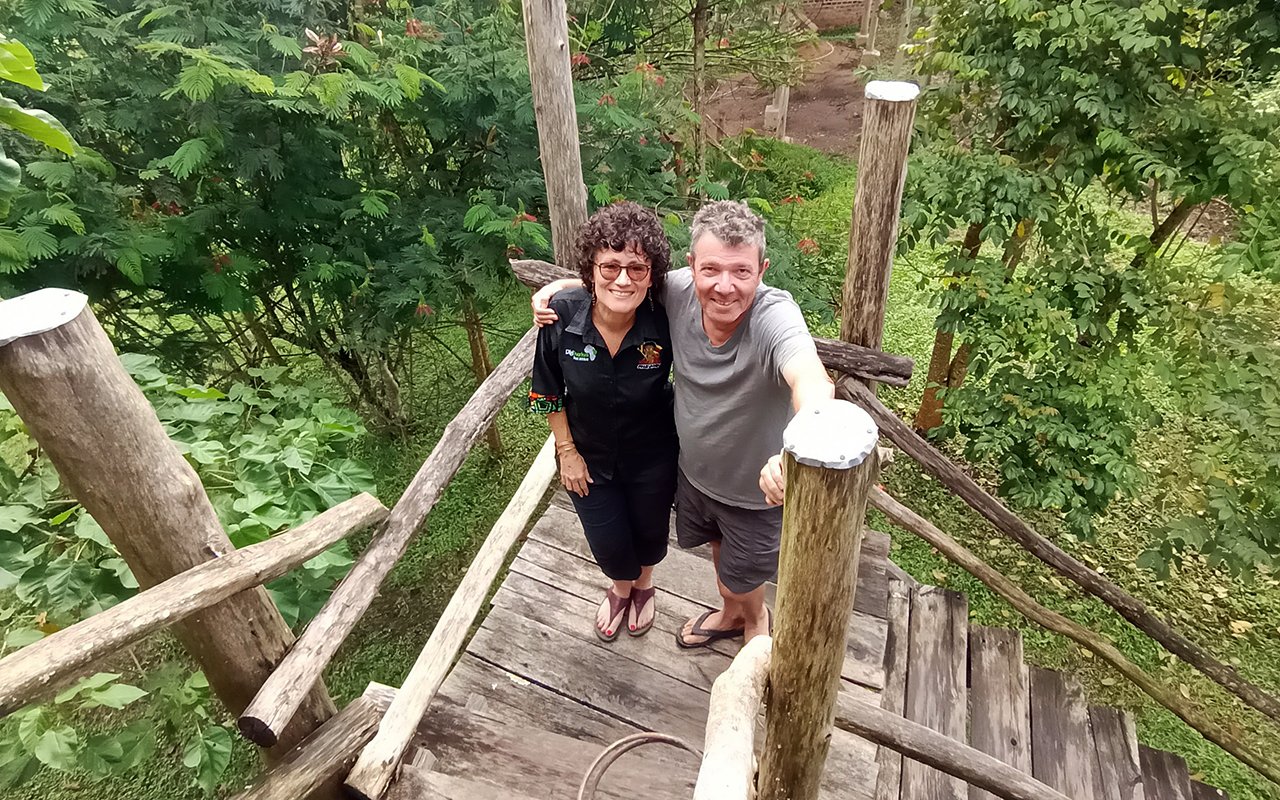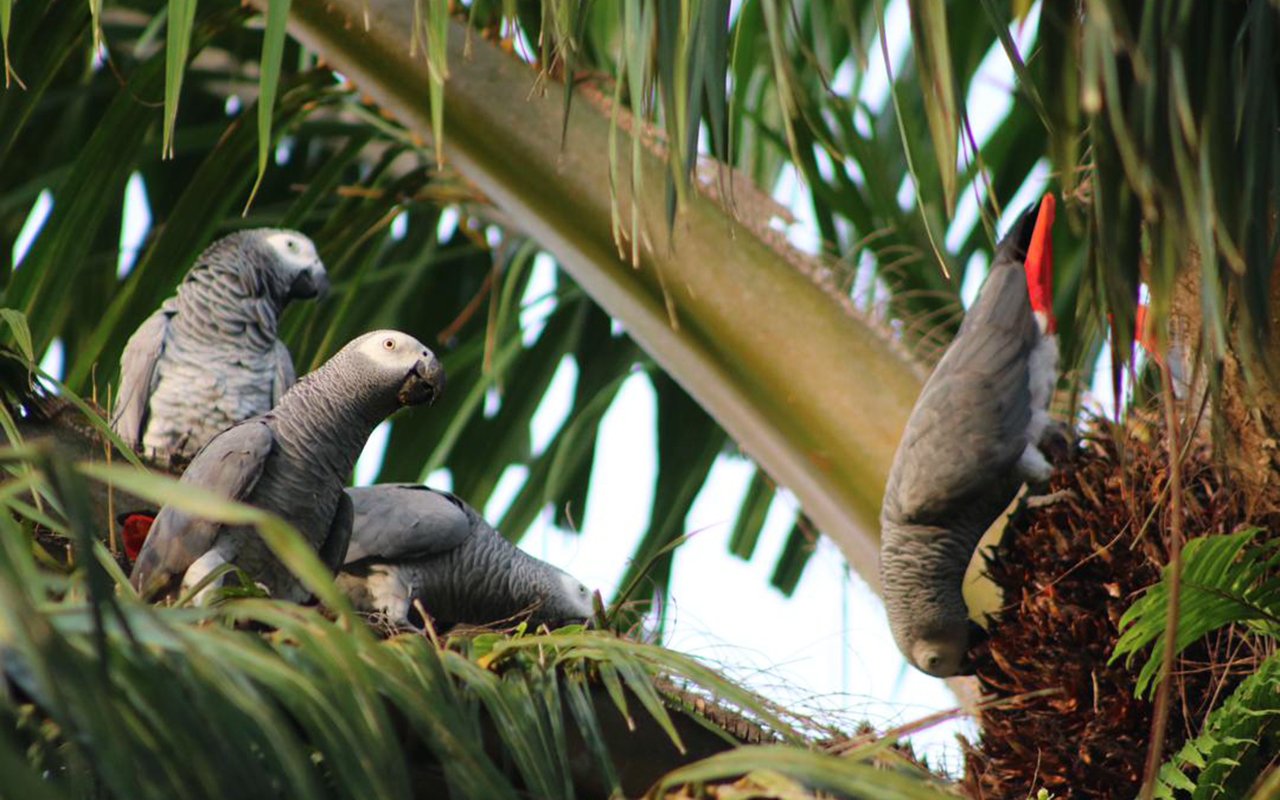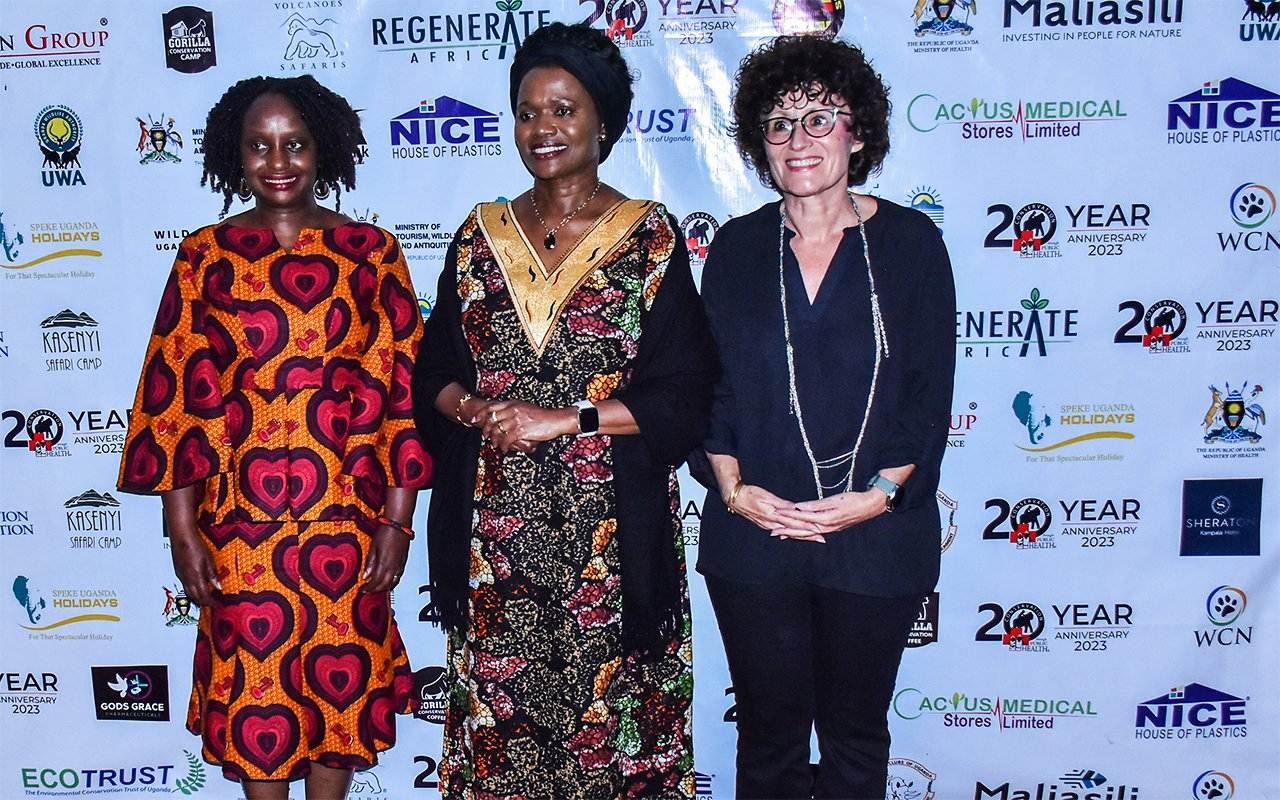Prime
Novel ways a podcast is promoting Ugandan tourism

Mr Philip Briggs, renowned South African travel writer with Beauvoisin at Sunbird Hill. Photo/Courtsey of Charlotte Beauvoisin, aka, Nagawa.
What you need to know:
- Digital optimisation. From writing her blog Diary of Muzungu to now The East African Travel Podcast, Charlotte Beauvoisin, aka, Nagawa, shares her journey and passion for tourism.
“There is no question in my mind that Uganda is the best birding destination in Africa if you combine the size, the compactness of the circuit, the ease of movement between the different habitats, and just the sheer variety of birds.”
This statement was made recently by world-renowned South African travel writer, Philip Briggs while speaking to Charlotte Beauvoisin on The East African Travel Podcast also known as Diary of a Muzungu. Beauvoisin, famed for her Diary of a Muzungu blog, is a British tourism expert who has lived in Uganda for the last 15 years. She needs no introduction. She is so at home in Uganda that her Ugandan friends named her Nagawa, a Kiganda name. This is usually a sign that a foreigner is now considered Ugandan.
But if you are like most people, you are probably wondering who Philip Briggs is and why he should be taken so seriously. He is an acclaimed South African travel writer, considered by many as the world’s most experienced guidebook author and certainly one of the most experienced writers on Africa.

African grey parrots in Kibaale Forest. Photo/Charlotte Beauvoisin.
In the world of tourism, Briggs is a god. His word carries water. He is well known across the world of tourism as the author of guidebooks to South Africa, Tanzania, Ethiopia, Malawi, Ghana, Mozambique, Kenya, Senegal and the Gambia, Namibia, and Rwanda, to mention but a few.
Closer to home, Briggs is the author of the Bradt Uganda Guidebook, arguably one of the best guides of Uganda for any tourist planning a trip to Uganda. He started researching the book during his first visit to Uganda in 1988.
The first edition of the book was published in 1994, and the 10th edition is coming out in December this year. The book is co-authored by Ugandan resident Andrew Roberts. It is the first book that most travellers and expats buy before coming to Uganda. It is full of information including historical background, detailed information on all the national parks, what you can do and see, and information about Kampala.
Such is the tourism connoisseur that declared Uganda the best birding destination on the continent, to thousands of people who visit the Diary of a Muzungu blog and listen to the podcast every month.
Briggs went ahead to qualify his statement thus: “There is just incredible diversity of birds here. The guiding caters to bird watchers. There are so many guides who know their birds really well, and most parks offer birding walks.
Uganda has the birds, it is easy to get around, and people are birding-savvy, which is not so much the case in countries that cater more to just the general ‘Big Five’ tourism. South Africa is the only other country I can think of where birding is such a recognised pursuit and interest.”
He added, “I think that anyone who has done a safari anywhere else in Africa and finds themselves interested in birds would then find Uganda the obvious country to come to.”
This weekly podcast is only two months old having hit the web on April 30, but with this kind of content, the potential to promote Uganda’s tourism is limitless. On top of showcasing Uganda’s tourism offerings, the podcast gives travel tips and hosts a range of interesting guests.

Left to Right: Dr Gladys Zikusooka , the Nnabagereka (C), and Beauvoisin at the celebration of 20 years of Conservation Through Public Health (CTPH). PHOTO/CONAN TUMUSIIME.
The very first guest was the Nnaabagareka who spoke excitedly about tracking gorillas and encouraged Ugandans to explore Uganda more. The podcast gives virtual tours of the wild to listeners, complete with sounds of forest leaves shaking in the wind, a wealth of birdsong, even hippos and pant-hooting chimpanzees.
“Cousins and close friends in Europe have been saying for a very long time, ‘Why don’t we come to Uganda for a couple of weeks?’ But since listening to the podcast, they are now saying, give us dates when we should come. Which airline should I fly with?’ So just having got this closer connection to me and my life through the podcast and the cool people that feature on it, I know they are one step closer to coming here now,” Beauvoisin says.
Conception
The podcast idea was conceived during lockdown. Beauvoisin had always been a blogger. That is how she became so well-known on Uganda’s social media and in the tourism circles. But because she was locked down in Kibale Forest where she lives and the internet was unreliable, it became harder to blog.
“Sending voice notes by WhatsApp was the easiest way to keep in contact with people because upcountry (Kibale), the phone network is not very reliable. Our Internet was terrible when we first went into lockdown and it was very frustrating. Not being able to access the Facebook community I have worked so hard to build didn’t help my morale either.
“But if I sent a voice note, it would just upload whenever the Internet was working. And I wouldn’t stress about not being online at a particular time of day. Friends then started telling me ‘Oh, it is amazing to hear the birds in the background. It sounds so tropical there!” she says.

Beauvoisin with Gaetano on Diary of a Muzungu. Photo/Diary of a Muzungu.
Beauvoisin would soon discover that people who had been reading her blog and checking her Facebook updates for the entire time she had spent in Uganda, were now freshly interested. Hearing the rich sounds of nature, they finally understood why she lived here. The voice notes had suddenly made the beauty of Uganda she had always blogged about finally come to life.
“Although many of us in Europe love nature, it is not as accessible as it is in Uganda. We have smaller birds, and they are not so colourful, so it means they are harder to identify yet in Uganda, everyone can be a bird watcher. This is because there are so many birds which are so bright and they are everywhere,” Beauvoisin says.
That is how the idea of the podcast was born in 2020. Since then, she has been dedicated to doing a lot of research, following different podcasters on social media and going through an online course on podcasting.
“I like consistency. Diary of a Muzungu has a good name as a brand because I have kept going. Even internationally, there are not many bloggers that have been going for 15 years or 16 years it is coming to. The average blog (95 per cent of them) does not last the first year.
“I did not want to start a podcast and feel so overwhelmed with it after a few weeks that I stopped. So I have worked hard on developing a new platform that has legs, that I hope will become popular for its inspiring content. But now it is all up to my audience!” she says.
As she researched the podcast concept, she looked around to see what was on Spotify and Apple Podcasts in terms of Africa travel content. She would discover that there was no dedicated Ugandan travel podcast or East African one for that matter. Only a couple of safari companies had a few stories from the bush.
“So I realised that there was a gap in the market,” she says.
Interesting people
Her choice of guests is specific. They must be people with an interesting story related to tourism and conservation in East Africa.
“I’ve got some interesting interviews coming up over the next couple of months. The World Parrot Trust discusses the endangered African grey parrots that we have in Uganda. Did you know, 95 per cent of the wild parrot population has been killed or captured for the pet trade? We are lucky enough to have wild parrots fly over my home at Sunbird Hill every day. We always look up and shout “Parrot!” every time we see them. They’re such fabulous birds, we want to do everything we can to protect them. Plus, the more we know about their habits, the better we can encourage tourists to come and see them,” she says.
In one episode, Beauvoisin interviews Chris Ketola, a Canadian researcher based in the Amazon, one of the most biodiverse spots on earth. Ketola recently concluded a 10-week trip in Uganda together with volunteers studying Uganda’s biodiversity. During his conversation on the East Africa Travel Podcast, he said he was blown away by Uganda.
“Imagine someone like Chris has studied wildlife for 25 years yet in Uganda he saw countless wildlife and bird species that he’s never seen before. I think that’s a very strong endorsement of the country. I’m sure that the episode will bring more visitors to Uganda because he gives very powerful testimonies,” she says.
Travel tips
Beauvoisin uses her experience in the country’s tourism to give travel tips to her audiences, whether how to get a tourist visa, where to stay, how to act culturally appropriate, just little insights that she has learned from her experience living in Uganda and traveling around the region.
“When I go to a country and I meet a British person like me and they have loved a particular lodge, I know that there is a good chance that I am going to like it too. The importance of having international promoters is that potential visitors can relate more easily to people from the same background as them. That is just human nature,” she says.
Background
Beauvoisin came to Uganda in 2009 as a professional volunteer. She gave up her job in infrastructure development to travel and have an immersive experience in Africa.
“I came to Uganda as a professional volunteer working with Voluntary Service Overseas. I was the marketing development manager for the Uganda Conservation Foundation and our work focused on building the capacity of Uganda Wildlife Authority in the national parks,” she says. She continues to support several conservation NGOs, particularly Conservation Through Public Health and In the Shadow of Chimpanzees, the NGO that is based at Sunbird Hill, where she lives.
Six months prior to leaving the UK, she started writing the Diary of a Muzungu blog to record the life-changing experience of moving from the corporate world in London to sub-Saharan Africa. Her Facebook page quickly became popular. She has written for magazines, guidebooks, websites and tour companies. The podcast is a new creative outlet for her.
When she is not writing, podcasting or travelling. Beauvoisin is a trainer. Many tourism entities in Uganda know her as a trainer in digital marketing and sustainable tourism. Her experience living at Sunbird Hill on the edge of Kibale National Park has given her an even deeper appreciation of nature.
“The life-affirming power of nature is what kept me motivated during lockdown. Forest birdsong is what inspired me to launch the podcast. I am excited to see how this can contribute to promoting tourism in Uganda.”




